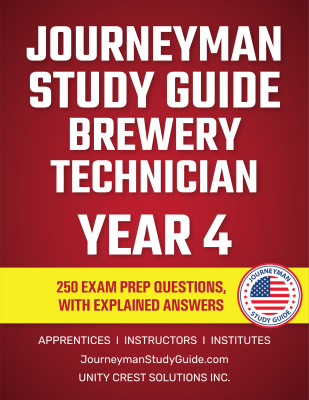Questions, Answers, & Explanations
Get clear explanations behind every answer, perfect for deeper learning and more thorough exam preparation.
Site Updates in Progress: Things might look different as we work on enhancing your experience.
What is a Brewery Technician?
A Brewery Technician is a skilled professional responsible for operating, maintaining, and troubleshooting the equipment used in brewing beer. They play a critical role in ensuring the production of high-quality beverages by maintaining precision, consistency, and adherence to industry regulations. Brewery Technicians work in microbreweries, craft breweries, and large-scale brewing operations across America, supporting some of the nation's most well-known beer manufacturers like Anheuser-Busch, MillerCoors, and Sierra Nevada Brewing Co.
Key Responsibilities:
Brewery Technicians handle various technical and mechanical tasks to ensure smooth production processes:
Skills and Traits for Success:
Successful Brewery Technicians have a mix of technical knowledge and hands-on expertise:
Industries Where Brewery Technicians Thrive:
Brewery Technicians are essential in multiple sectors within the American beverage industry:
Why Choose This Career?
A career as a Brewery Technician offers excellent job prospects and career advancement opportunities:
Ready to Start Your Career as a Brewery Technician?
Begin your professional journey with our specialized study resources, including comprehensive Q&A, detailed Q/A Explanation, and interactive Online Tests, tailored specifically for Brewery Technicians.
What to Expect on the Brewery Technician Certification Exam
The Brewery Technician Certification Exam ensures professionals meet industry standards in brewing operations, equipment maintenance, safety, and quality control. Many employers, including Anheuser-Busch and Sierra Nevada Brewing Co., prefer certified technicians who demonstrate expertise in brewing processes and regulatory compliance.
Exam Format:
Key Topics Covered:
Passing Requirements:
Most certifying bodies require a score of 70% or higher to pass. Some programs include a practical skills test alongside the written exam.
Tips for Effective Preparation:
Ready to Pass Your Certification Exam?
Prepare with our expert-designed study resources tailored for Brewery Technicians.
What Types of Questions Are on the Brewery Technician Certification Exam?
The certification exam evaluates knowledge of brewing science, equipment maintenance, safety regulations, and quality control processes. Employers such as Anheuser-Busch, MillerCoors, and New Belgium Brewing value certified technicians with proven expertise.
Common Question Formats:
Sample Questions:
Tips for Exam Success:
Ready to Excel on Exam Day?
Prepare with our specialized Q&A, Q/A Explanation, and Online Tests for Brewery Technicians.
What Is It Like to Work as a Brewery Technician?
A Brewery Technician's day is dynamic, involving hands-on brewing operations, equipment maintenance, and quality control checks. Whether working for a craft brewery like Sierra Nevada or a large-scale producer like Anheuser-Busch, technicians play a vital role in ensuring consistent and high-quality beer production.
Morning: Preparing for the Day
Midday: Brewing Operations and Troubleshooting
Afternoon: Quality Control and Clean-Up
Challenges and Rewards
Ready to Start Your Career?
Enhance your knowledge and skills with our Q&A, Q/A Explanation, and Online Tests designed for Brewery Technicians.
What Are the Long-Term Benefits of a Career as a Brewery Technician?
Brewery Technicians enjoy strong career growth potential, competitive wages, and opportunities to specialize in brewing science, quality assurance, or operations management.
Earning Potential in Brewery Operations
Career Growth Opportunities
Why Choose Brewery Operations?
Ready to Advance Your Career in Brewing?
Prepare for certification and long-term success with our Q&A, Q/A Explanation, and Online Tests for Brewery Technicians.
How Much Can You Earn as a Brewery Technician?
The salary of a Brewery Technician depends on experience, location, and employer. Large-scale breweries such as Anheuser-Busch, Molson Coors, and Heineken USA offer competitive wages, while craft breweries provide opportunities for creativity and career growth.
General Wage Ranges:
Factors Affecting Salary:
Want to Increase Your Earning Potential?
Advance your brewing career with our specialized Q&A, Q/A Explanation, and Online Tests designed to help you master brewing techniques and safety compliance.
What Tools and Resources Do Brewery Technicians Need to Succeed?
Brewery Technicians rely on specialized tools and resources to ensure efficiency, maintain safety, and produce high-quality beer. Understanding and using the right equipment is essential for success in large breweries like MillerCoors and independent craft breweries such as Dogfish Head.
Essential Tools for Brewery Technicians:
Recommended Learning Resources:
Why the Right Tools Matter
Using proper tools and educational resources improves efficiency, ensures product consistency, and enhances safety in brewery operations.
Ready to Equip Yourself for Success?
Get ahead in your brewing career with our Q&A, Q/A Explanation, and Online Tests designed for Brewery Technicians.
Where Can You Learn Brewery Technician Skills?
Aspiring Brewery Technicians in the U.S. can enroll in specialized education programs that provide hands-on training in brewing science, equipment operation, and safety compliance. Institutions such as the Siebel Institute of Technology (Illinois) and the American Brewers Guild (Vermont) offer some of the best programs for those looking to enter the brewing industry. Many major breweries, including Anheuser-Busch and Molson Coors, also provide in-house training programs for employees.
Types of Education Programs:
What to Expect in Training Programs:
Choosing the Right Program:
Why Education Matters:
Proper training provides essential skills, improves job placement opportunities, and sets the foundation for a successful career in the brewing industry.
Ready to Begin Your Brewing Education?
Start your journey with our Q&A, Q/A Explanation, and Online Tests designed for Brewery Technicians.
Why Join a Union or Connect with Employers?
Brewery Technicians can benefit from joining unions and networking with top brewing employers. Industry unions help secure competitive wages, benefits, and job stability, while major breweries offer structured career growth opportunities.
Benefits of Joining a Union:
Top Unions for Brewery Technicians:
Connecting with Employers:
What Employers Look For:
How to Find Work Through Unions and Employers:
Why Unions and Employers Matter:
Building relationships with employers and unions enhances career growth, increases earning potential, and ensures long-term success in the brewing industry.
Ready to Connect with the Best Opportunities?
Advance your career with our Q&A, Q/A Explanation, and Online Tests designed for Brewery Technicians.
How to Stay Ahead in the Brewing Industry
The brewing industry continues to evolve with advancements in technology, sustainability practices, and quality control innovations. Brewery Technicians who stay informed about industry trends and advancements position themselves for long-term success with major employers like Anheuser-Busch, Molson Coors, and Sierra Nevada Brewing Co.
Emerging Trends in Brewing:
Best Practices for Professional Growth:
Challenges and Opportunities in Brewing:
Sustainability in Brewing Operations:
Why Staying Ahead Matters:
Remaining informed on brewing advancements, sustainability efforts, and industry trends ensures a competitive edge in the job market and enhances career stability in the ever-growing brewing industry.
Stay Competitive and Informed:
Elevate your brewing career with our Q&A, Q/A Explanation, and Online Tests, designed for Brewery Technicians.
Get clear explanations behind every answer, perfect for deeper learning and more thorough exam preparation.
Quick and easy practice to test your knowledge anytime, anywhere—ideal for simple, on-the-go preparation.










